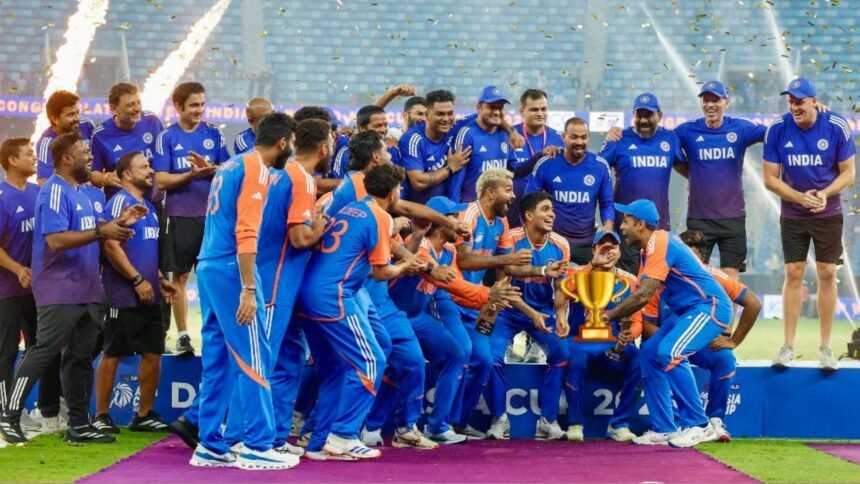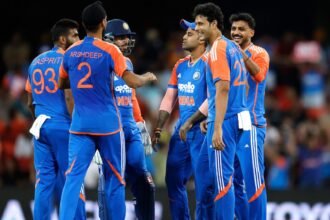Dubai: In a moment that will echo far beyond the boundaries of Dubai International Stadium, the Indian cricket team refused to accept the Asia Cup trophy during the post-match presentation ceremony, despite clinching a dramatic five-wicket win over Pakistan in the final. The decision, unprecedented in the history of the tournament, underlined how political undercurrents between the two nations continue to spill over onto the sporting field.
The match itself was worthy of a classic. Tilak Varma’s ice-cold 69* and Shivam Dube’s crucial 33 helped India overcome an early collapse to secure their ninth Asia Cup title. Yet, as the game ended in a frenzy of emotion and relief around 10.30 pm local time, the presentation ceremony descended into a spectacle of confusion and delay.
For over an hour, the stage lay unprepared, the crowd grew restless, and dignitaries huddled in tense discussions. At the heart of the impasse was Mohsin Naqvi the Asian Cricket Council president, PCB chairman, and also Pakistan’s Interior Minister. Reports had already suggested that the Indian team was unwilling to accept the trophy directly from him, a position that hardened with every passing minute. Eventually, the trophy was removed altogether, an anticlimactic gesture symbolic of the political chasm between the two sides.
Individual awards for India’s heroes Kuldeep Yadav, Abhishek Sharma, and Tilak Varma—were handed out by other dignitaries, while the players made it a point not to acknowledge Naqvi, who stood conspicuously still, even refraining from applauding them. In contrast, Pakistan captain Salman Agha collected the runners-up cheque directly from Naqvi, highlighting the deep divide in the evening’s optics.
When India finally took the podium, there was no trophy in sight. Instead, Suryakumar Yadav and his teammates lifted their arms aloft to form an imaginary cup, a symbolic act that drew roars from the Indian fans still present in the stands. For them, the symbolism carried as much weight as the silverware itself—a declaration that victory belongs to the team, not to the politics surrounding it.
The refusal was not an isolated act. Throughout the tournament, India had avoided shaking hands with Pakistan’s players, whether at tosses or post-match rituals. Heated verbal exchanges in earlier matches, fines imposed on Suryakumar Yadav and Haris Rauf, and repeated stand-offs on the field had already created an atmosphere of confrontation. By the time the final arrived, India’s stand had been telegraphed well in advance: cricket would be played, but gestures of cordiality would not be extended.
The fallout is likely to be significant. For the ACC, the credibility of its showpiece event has taken a hit. For India, it was a carefully calibrated move one that may resonate domestically as a statement of principle but also risk criticism for blurring the line between sport and state. For Pakistan, it was another bruising chapter, on and off the field, as a collapse from 107/1 to 146 all out was compounded by a presentation ceremony that ended with their rivals celebrating with a trophy that did not exist.
The Dubai night thus produced two unforgettable images: Tilak Varma punching the air after a nerveless half-century, and the Indian team holding up an invisible cup that said more than any piece of metal could. Between the boundaries and the politics, cricket once again revealed itself as a theatre where symbols matter as much as scores.















